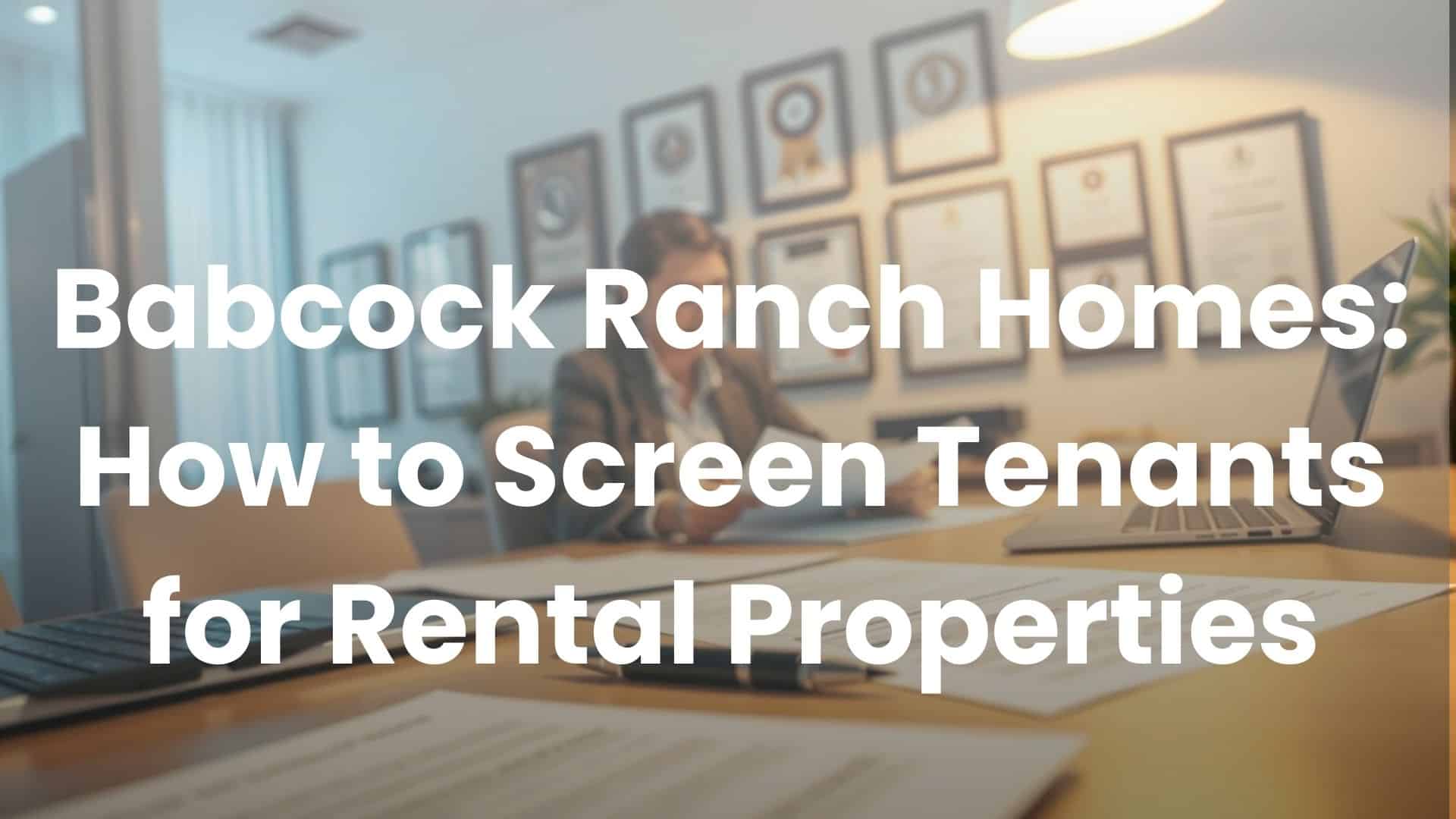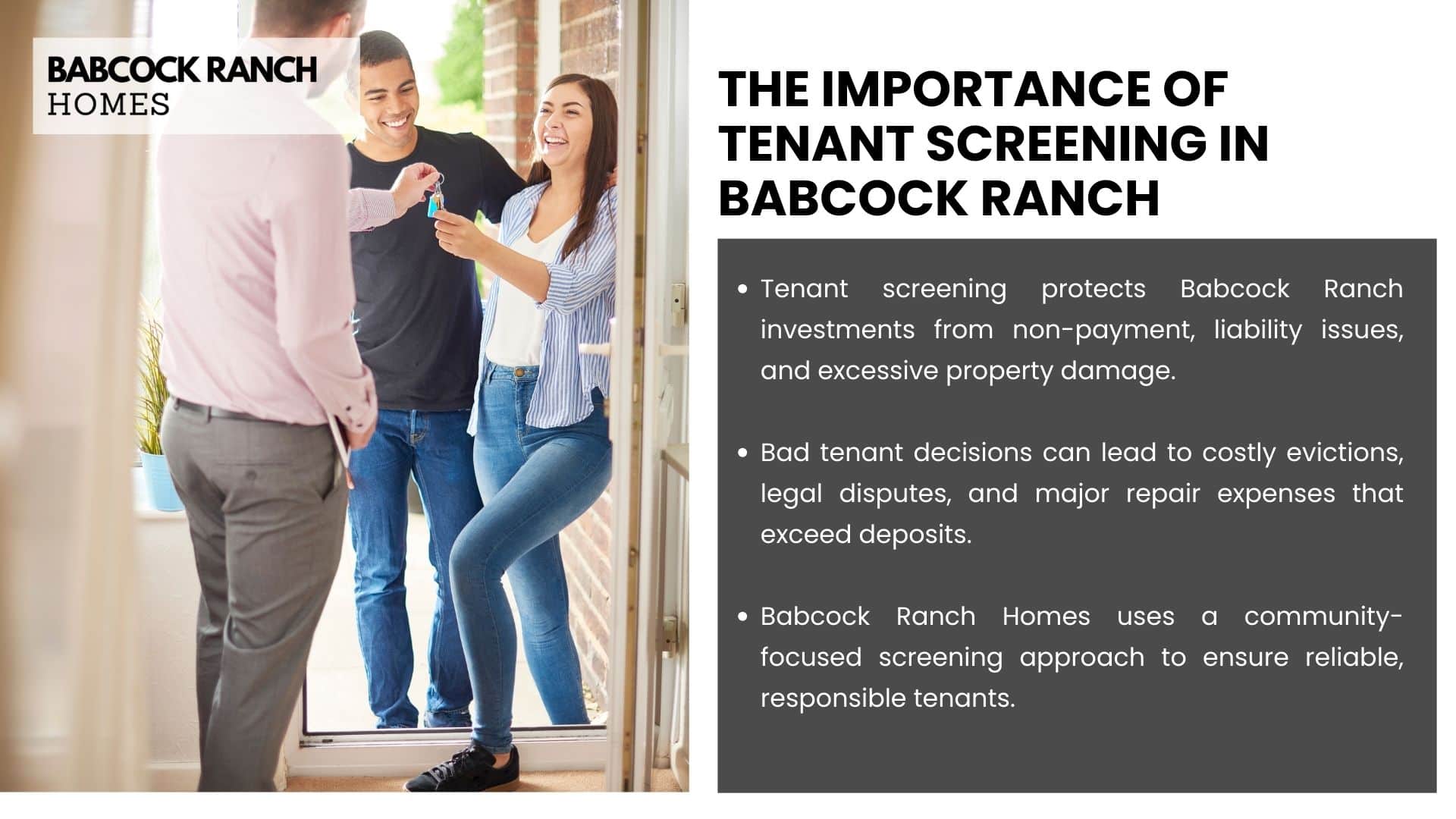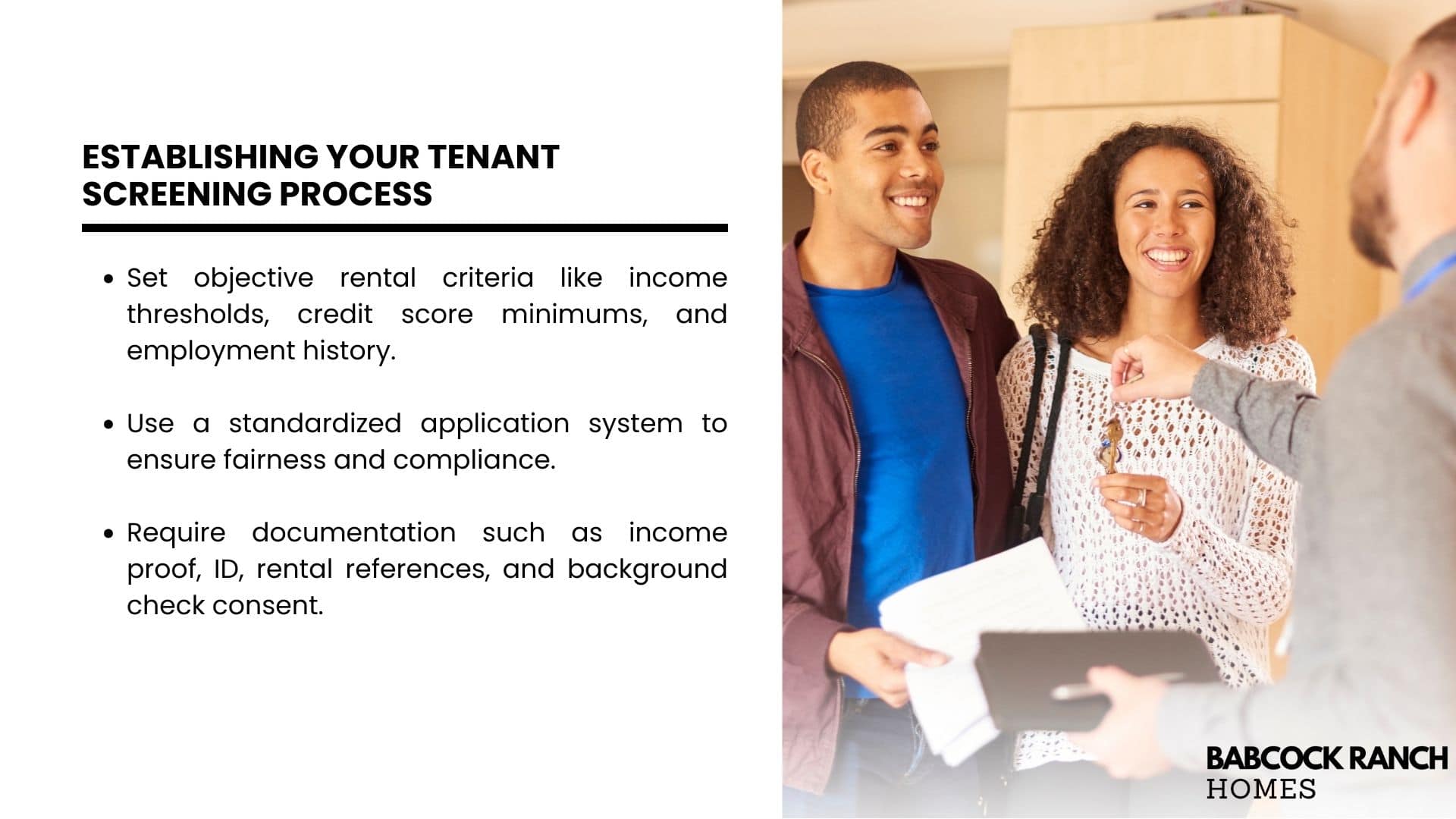
Effective tenant screening is crucial for landlords to protect their investment properties in Babcock Ranch, Florida. Selecting a reliable tenant can help maintain a strong cash flow and robust returns.
At Babcock Ranch Homes, we understand the importance of thorough screening for rental properties. A well-structured screening process helps landlords avoid potential risks, such as eviction or discrimination accusations. For expert guidance on managing your rental property, call us at 518-569-7173.
Our comprehensive guide will walk you through the essential steps of effective tenant screening, ensuring you make informed decisions about prospective tenants and maintain profitable rental properties.
Key Takeaways
- Understand the importance of tenant screening for rental properties
- Learn how to establish clear rental criteria for prospective tenants
- Discover the benefits of conducting thorough background checks
- Implement a standardized screening process that complies with fair housing laws
- Minimize risk and maximize returns on your Babcock Ranch rental properties
The Importance of Tenant Screening in Babcock Ranch
In Babcock Ranch, thorough tenant screening serves as the foundation for successful property management. Selecting a good tenant can help you keep cash flow strong and potential returns robust, while making the wrong decision could result in an eviction or a landlord being accused of discrimination.

Protecting Your Investment Property
Investment properties in Babcock Ranch represent significant financial commitments. Proper screening helps protect these assets from tenants who might cause property damage, create liability issues, or fail to pay rent consistently. By implementing a comprehensive screening process, landlords can safeguard their investment and ensure a stable income stream.
The Cost of Bad Tenant Decisions
The financial impact of problematic tenants extends beyond just missed rent payments. Eviction proceedings in Florida can cost landlords thousands of dollars and take months to complete, creating extended periods of lost income. Additionally, property damage from negligent tenants can quickly erode profit margins, with repairs often exceeding security deposits and requiring significant out-of-pocket expenses from landlords.
Babcock Ranch Homes’ Approach to Tenant Management
Babcock Ranch Homes has developed a comprehensive screening process specifically tailored to the unique Babcock Ranch community. Our approach balances thorough vetting with a positive experience for quality applicants. We focus on finding residents who will not only pay rent reliably but also contribute positively to the distinctive community atmosphere that makes Babcock Ranch special.
Understanding Fair Housing Laws for Landlords
Understanding fair housing laws is crucial for landlords in Babcock Ranch to maintain a legally compliant tenant screening process. Fair housing laws are designed to prevent discrimination and ensure that all applicants are treated equally.
Federal Fair Housing Act Protections
The Federal Fair Housing Act establishes seven protected classes: race, color, national origin, religion, disability, sex, and familial status. Landlords in Babcock Ranch must not discriminate against applicants based on these characteristics. The Act applies to residential landlords and is enforced by the U.S. Department of Housing and Urban Development (HUD). To comply with the Federal Fair Housing Act, landlords should ensure that their tenant screening process is fair and unbiased.
- Landlords must not inquire about an applicant’s medical history or disabilities.
- They should avoid making assumptions about an applicant’s ability to rent based on their familial status.
- All applicants should be treated equally, regardless of their national origin or religion.
Florida-Specific Housing Regulations
Florida has its own set of housing regulations that expand on the Federal Fair Housing Act. For instance, Florida law prohibits discrimination based on additional factors, which Babcock Ranch landlords must be aware of. It is essential for landlords to familiarize themselves with both federal and state laws to ensure compliance.

Avoiding Discrimination Claims in Babcock Ranch
To avoid discrimination claims, landlords in Babcock Ranch should create a standardized screening process that applies the same criteria to all applicants. This process should be based on objective criteria related to an applicant’s ability to fulfill lease obligations, rather than subjective impressions or protected characteristics. By documenting all screening decisions and maintaining a fair and consistent process, landlords can defend against potential discrimination claims and maintain the inclusive reputation of Babcock Ranch.
By understanding and complying with fair housing laws, landlords can ensure a smooth and legally compliant tenant screening process.
Establishing Your Tenant Screening Process
A well-structured tenant screening process is essential for property investors to protect their investment and comply with fair housing laws. Having a systematic approach in place helps ensure that every applicant is treated equally and fairly, reducing the risk of violating fair housing laws or skipping important screening steps.
Setting Clear Rental Criteria
Developing a structured tenant screening process begins with establishing clear, objective rental criteria that align with both your property investment goals and the Babcock Ranch community standards. Effective rental criteria should include specific, measurable benchmarks such as income requirements (typically 2.5-3 times monthly rent), minimum credit scores, employment stability, and rental history verification.
For instance, a landlord might set a minimum credit score of 650 and require applicants to have a stable employment history of at least two years. As Forbes suggests, “Credit scores are a crucial factor in determining the creditworthiness of potential tenants.”
“A good credit score indicates a history of on-time payments and responsible financial behavior.”
| Criteria | Benchmark |
|---|---|
| Income Requirement | 2.5-3 times monthly rent |
| Minimum Credit Score | 650 |
| Employment Stability | At least 2 years |
Creating a Standardized Application System
Creating a standardized application system ensures all applicants are evaluated using the same metrics, streamlining your decision-making process and strengthening compliance with fair housing regulations. The application system should include digital or physical forms that collect comprehensive information while remaining accessible to all potential applicants.

Documentation Requirements for Applicants
Documentation requirements should be clearly communicated upfront and include proof of income (pay stubs, tax returns), identification, rental history references, and authorization for background and credit checks. Maintaining consistent documentation of your screening process creates an audit trail that protects landlords if screening decisions are ever questioned or challenged legally.
- Proof of income
- Identification
- Rental history references
- Authorization for background and credit checks
By establishing a comprehensive tenant screening process, landlords can ensure they’re selecting reliable tenants while minimizing risks. This systematic approach not only protects the investment property but also helps maintain a positive rental experience.
How to Screen Tenants Effectively
To protect their investments, landlords in Babcock Ranch must implement a thorough tenant screening process. This involves several key steps that help identify reliable tenants and minimize potential risks.
Pre-Screening Through Rental Listings
Effective tenant screening begins with clear and comprehensive rental listings. By including specific rental criteria in property advertisements, such as income requirements, pet policies, and credit score minimums, landlords can attract qualified applicants and deter those who don’t meet their standards. This pre-screening process saves time and reduces the number of unqualified applications.
Collecting and Reviewing Applications
When collecting applications, landlords should implement a consistent process that includes verification of identity, comprehensive application forms, and application fee collection. This ensures that all prospective tenants are held to the same standards and demonstrate serious interest in the rental property. Reviewing applications methodically, comparing each applicant’s information against established criteria, and documenting the evaluation process are crucial for making informed decisions.
Red Flags to Watch For in Applications
Landlords should be trained to identify common red flags in applications, including gaps in rental history, frequent moves, inconsistent employment patterns, or discrepancies in reported information. Special attention should be given to how applicants explain previous evictions, late payments, or credit issues, as their transparency and accountability can indicate future behavior. For Babcock Ranch properties, considering community-specific factors such as applicants’ understanding of and willingness to abide by community guidelines is also important.
By following these steps and being vigilant for red flags, landlords can effectively screen tenants and protect their investments.
Essential Background Checks for Rental Properties
Background checks form the backbone of a robust tenant screening process for rental properties. These checks provide landlords with critical information about potential tenants, helping them make informed decisions.
Credit History Evaluation
Credit history evaluation is a crucial aspect of tenant screening. It involves examining an applicant’s credit score, payment patterns, debt-to-income ratio, and any collections accounts. Credit scores range from 300 to 850, indicating the applicant’s financial responsibility. For instance, a low credit score coupled with a history of late payments may indicate potential rent payment issues.
When evaluating credit reports, consider the context behind negative marks. Recent financial hardships with an otherwise strong credit history might warrant different consideration than long-term patterns of financial mismanagement.
Criminal Background Screening
Criminal background screening is another vital component, focusing on convictions that reasonably relate to tenant responsibilities and property safety. Landlords must balance property protection with fair housing considerations, ensuring compliance with Florida-specific restrictions on criminal screening.
Establishing consistent standards for criminal background evaluation is essential. This includes considering the nature of offenses, when they occurred, and evidence of rehabilitation.
Eviction History Verification
Eviction history verification is particularly crucial as past evictions strongly correlate with future rental problems. Landlords should search court records in all counties where the applicant has previously resided, not just their most recent location.
Professional screening services can provide more comprehensive eviction records, including cases that were filed but later dismissed or settled. This information helps landlords assess the risk associated with potential tenants.
| Background Check Type | Purpose | Key Considerations |
|---|---|---|
| Credit History Evaluation | Assess financial responsibility | Credit score, payment patterns, debt-to-income ratio |
| Criminal Background Screening | Evaluate potential safety risks | Nature of offenses, timing, evidence of rehabilitation |
| Eviction History Verification | Identify past rental issues | Past evictions, court records from previous residences |
Verifying Employment and Rental History
Employment and rental history verification provides valuable insights into an applicant’s reliability and responsibility. This step is crucial in assessing whether a potential tenant will be a good fit for a rental property in Babcock Ranch.
Contacting Previous Landlords Effectively
When contacting previous landlords, it’s essential to ask the right questions to gather comprehensive information about the applicant’s rental history. Develop a structured set of questions that addresses payment history, property care, rule compliance, and whether they would rent to the applicant again. It’s recommended to speak with at least two previous landlords to get a well-rounded view, as the current landlord may provide a biased reference to facilitate the tenant’s departure.
- Ask about the applicant’s payment history, including any late payments or unpaid rent.
- Inquire about the condition of the property during and after the applicant’s tenancy.
- Discuss any issues related to rule compliance, noise complaints, or other disturbances.
Employment and Income Verification
Verifying an applicant’s employment status and income is vital to ensure they can afford the rent. This involves confirming the applicant’s current employment, length of employment, position, and actual income. For self-employed applicants, additional documentation such as tax returns or business licenses may be required to verify their income stability.
Assessing Debt-to-Income Ratios
Calculating an applicant’s debt-to-income ratio is a critical step in determining their financial capability to pay rent on time. This is done by comparing their monthly debt obligations, including the proposed rent, to their gross monthly income. Financial experts recommend that housing costs should not exceed 30-35% of the applicant’s income. In Babcock Ranch’s unique market, it’s also important to consider how an applicant’s employment situation aligns with the community’s location and amenities.
By thoroughly verifying employment and rental history, landlords can make informed decisions and minimize the risk of problematic tenancies.
Conclusion: Making Informed Tenant Selection Decisions
In the competitive rental market of Babcock Ranch, thorough tenant screening can make all the difference. Effective tenant screening culminates in making informed selection decisions that balance risk management with fair housing compliance while finding tenants who will pay rent on time and care for your rental property.
When faced with multiple qualified applicants, landlords should rely on their predetermined screening criteria rather than subjective impressions to ensure fair, defensible selection decisions. Consider implementing a consistent tiebreaker policy, such as “first qualified applicant” or highest credit score, to resolve situations with multiple qualified candidates in an objective manner.
Documenting the selection process thoroughly is also crucial, including reasons for approving or denying each application based on established criteria. This creates a paper trail that protects landlords from potential discrimination claims. Screening tenants is an investment of time that pays significant dividends by reducing turnover costs, property damage, and legal complications throughout the tenancy.
For assistance with tenant screening or complete property management services in Babcock Ranch, contact Babcock Ranch Homes at 518-569-7173. The unique character of the Babcock Ranch community makes tenant selection particularly important, as finding residents who appreciate and contribute to the neighborhood’s distinctive atmosphere benefits both individual properties and the community as a whole.
By adopting a rigorous tenant screening process, landlords can ensure they select reliable tenants who will pay rent on time, thereby protecting and maximizing their rental property investment.




















